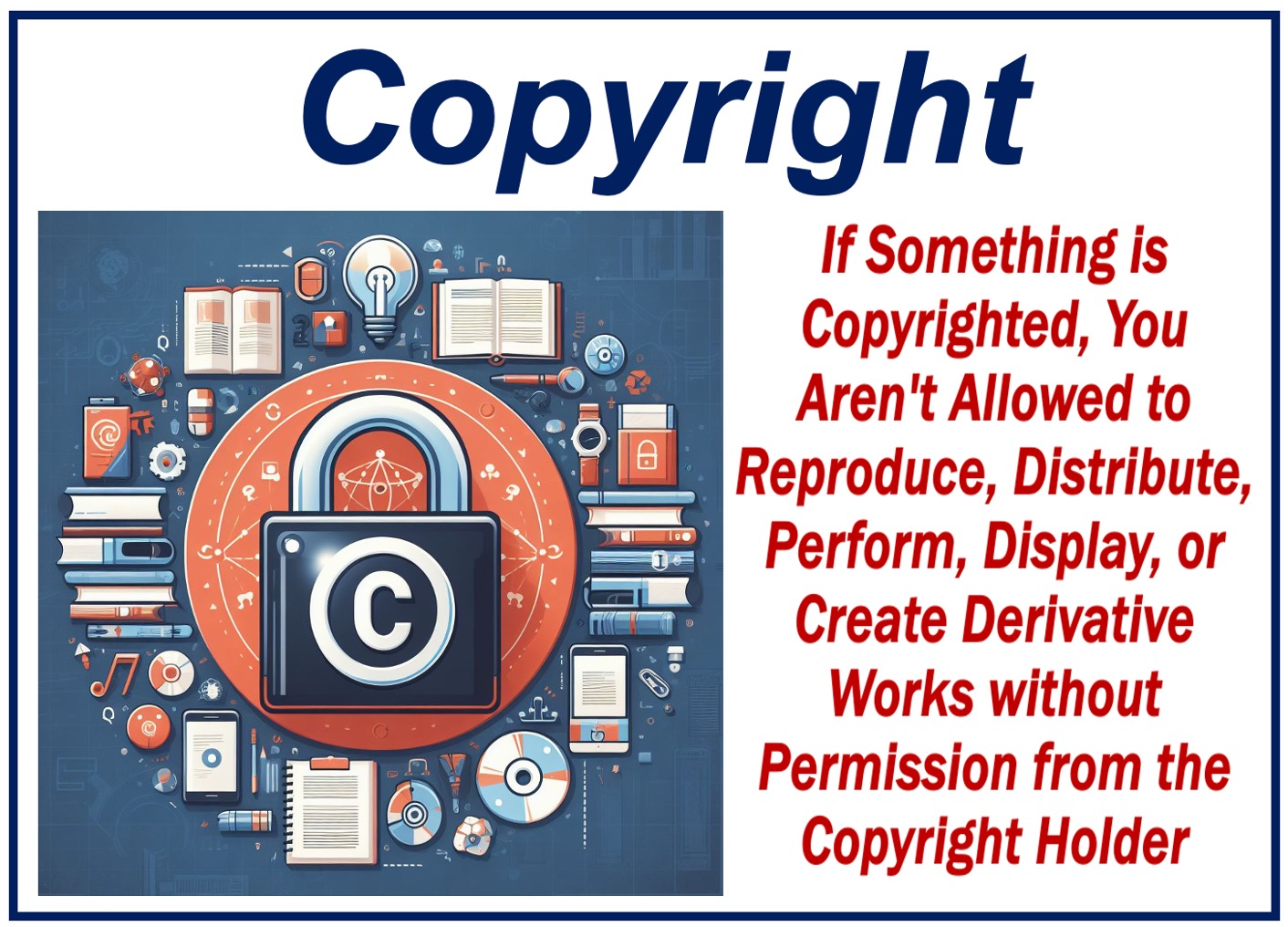Copyright is a legal right that gives the creator of an original work exclusive rights to its use and distribution. This allows the creator or copyright holder to reproduce, distribute, perform, or adapt their work for a specific period. Literature, music, films, artwork, and more can be protected under copyright.
According to www.copyright.gov/:
“Copyright is a type of intellectual property that protects original works of authorship as soon as an author fixes the work in a tangible form of expression. In copyright law, there are a lot of different types of works, including paintings, photographs, illustrations, musical compositions, sound recordings, computer programs, books, poems, blog posts, movies, architectural works, plays, and so much more!”
Key Features
- Exclusivity
The primary person with the legal power to decide how their work is used or adapted is the copyright holder.
- Duration
Copyright doesn’t last indefinitely. The duration varies, depending on the jurisdiction and type of work, although it often lasts for several decades (typically 50 or 70 years) after the creator’s death.
- Transferability
Copyrights can be transferred and sold a lot like physical property.
- Accreditation
Certain governments allow creators to keep their non-economic rights, such as the ability to be credited for their work.

Why copyright matters
Copyright matters for several reasons. Let’s have a look at some of them:
- Incentive for creators
This makes sure creators can benefit from their work. Copyright gives an incentive for innovation and creativity. If intellectual property laws did not exist, there would not be as many inventions as there are. Intellectual property is a concept that grants creators legal rights to their inventions, designs, and artistic works, promoting innovation and economic growth. Examples include copyright, patents, and trademarks.
- Economic rights
It enables creators to profit from their work by licensing, selling, or directly using it in various ways.
- Protection
Creators are protected from unauthorized use or replication of their work, so that they receive the correct recognition and compensation.
Fair use and exceptions
Although copyright offers broad protections, there are some exceptions:
- Fair use
In some cases, the use of copyrighted material without permission is allowed. Examples include for news reporting, teaching, and research purposes.
- Public domain
Copyrighted work enters the public domain after the protection expires, which means that it can be used by anyone. For example, in the US and UK, this typically occurs 70 years after the author’s death (there are some minor exceptions).
- Compulsory Licenses
Under certain circumstances, authors may be required to grant others the right to use their works, usually in exchange for a set amount of money. Musicians must allow others to cover their songs after the first recording is released, provided the new artist pays a statutory royalty fee.
Digital challenges
In today’s digital age, the following challenges have emerged or intensified:
- Piracy
It is much easier to copy people’s works digitally than it was with analog methods such as photocopying, tape recording, or reprinting on paper.
- Globalization
The globalization of the Internet has led to an increase in international disagreements about copyright.
- Evolving Media
The advent of streaming platforms and various new forms of media presents fresh challenges to copyright enforcement and legislation.
With the advent of advanced digital technologies, copyright enforcement agencies and creators are increasingly using sophisticated methods like digital watermarking and blockchain to track and protect copyrighted materials.
Other languages
The notion of copyright, trademarks, and patents, i.e., intellectual property is widely discussed and legislated across the world.
Nearly all countries globally respect international laws related to intellectual property, especially those that trade (import and export) extensively, such as the US, Canada, most of Europe, Japan, South Korea, Australasia, and many emerging economies.
Here is the term ‘copyright’ in various widely-spoken languages:
Derecho de autor (Spanish), Direito autoral (Portuguese), Urheberrecht (German), Droit d’auteur (French), Diritto d’autore (Italian), Prawo autorskie (Polish), Авторское право (Russian), حقوق النشر (Arabic), حق تکثیر (Farsi), कॉपीराइट (Hindi), کاپی رائٹ (Urdu), কপিরাইট (Bengali), 版權 (Cantonese Chinese), 著作権 (Mandarin Chinese), 著作権 (Japanese), 저작권 (Korean), Hak cipta (Indonesian), Bản quyền (Vietnamese), Telif hakkı (Turkish).
Compound phrases with ‘copyright’
Here are seven compound phrases commonly used in the world of copyrights.:
-
Copyright Law
Legal framework that governs the rights of creators over their original works.
-
Copyright Infringement
Unauthorized use or reproduction of copyrighted material without permission. If you sell pirated movies, you are committing copyright infringement.
-
Copyright Notice
A statement or symbol indicating the existence of copyright and identifying the copyright holder. For example, ‘© 2023 John Doe’ on a book indicates that John Doe holds the copyright to the content of that book for the year 2023.
-
Copyright Registration
The process of recording a copyright with a governmental body to establish a public record. If you are an author, musician, filmmaker, artist, photographer, software developer, or creator of any original work, you should register your copyright as soon as your work is complete and fixed in a tangible form.
-
Copyright License
A legal permission granted by the copyright holder to use the copyrighted material in specific ways. For example: “That pub has a copyright license to show the World Cup Final on its TVs for the public to watch.”
-
Copyright Protection
Legal measures and rights that safeguard a creator’s original work from unauthorized use.
-
Copyright Exemption
Specific situations where copyrighted material can be used without permission, often for purposes like education or research. For example, if you are a teacher, you may use excerpts from a copyrighted book in your classroom for educational purposes without needing permission from the copyright holder.
Two Video Presentations
These two educational videos, from our sister channel on YouTube – Marketing Business Network, explain what ‘Copyright’ and ‘Intellectual Property’ mean using simple and easy-to-understand language and examples.
-
What is Copyright?
-
What is Intellectual Property?
Written by Nicolas Perez Diaz, October 29, 2023.
